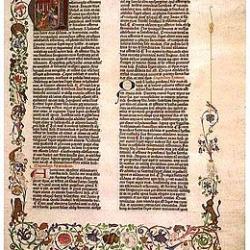Pope Francis recently stated on Italian television that the line Lord’s Prayer, “Do not lead us into temptation” (Matthew 6:13), “is not a good translation because it speaks of a God who induces temptation.” He instead argued the verse should be understood, “Do not let us fall into temptation.”
This suggestion by the Roman Catholic Church’s top leader has led to much discussion regarding the true understanding of this phrase in the Lord’s Prayer. Have translators really been wrong all these years?
Looking at the original Greek text of Matthew 6:13, the verb translated “lead” is an aorist active subjunctive (εἰσενέγκῃς) with a negative particle. This simply mean “do not lead” is the originally intended meaning.
The Pope wants it to mean “do not let” because he does not want people to think God is actively leading us into temptation. While this does fit James 1:13 (When tempted, no one should say, “God is tempting me.” For God cannot be tempted by evil, nor does he tempt anyone), this subtle change overlooks another important perspective found in Matthew’s Gospel.
A quick look at Matthew 4:1 shows, “Then Jesus was led by the Spirit into the wilderness to be tempted by the devil.” Just two chapters before the Lord’s Prayer teaches to pray “lead us not into temptation,” Jesus was led into a time of temptation. New Testament scholar Dr. Daniel Wallace notes:
Immediately after Jesus’ baptism, we are told that he “was led up into the wilderness by the Spirit to be tempted by the devil” (Matthew 4.1). The Greek text indicates that the purpose of the Spirit’s leading Jesus into the wilderness was so that he would be tempted by the devil (“to be tempted” [πειρασθῆναι] is an infinitive of purpose, giving the purpose of the Spirit’s leading). Mark words this even more starkly: “Immediately the Spirit drove him into the wilderness” (Mark 1.13).
Evidently, there is a sense in which Jesus was delivered into the hands of the evil one, by the Holy Spirit himself, to be tempted. But the Greek here makes an interesting point about who is responsible for what. Two passive verbs are used in Matt 4.1— ἀνήχθη (“he was led”) and πειρασθῆναι (“to be tempted”). The agents are listed with identical prepositions: ὑπό. This is the preposition used especially for ultimate agent. It is rare to see ὑπό followed by πνεύματος (“Spirit”) in the NT (only five passages). Doing so here, Matthew shows that the Spirit is not subordinate to the devil but is the agent ultimately responsible for leading Jesus into the wilderness, while the devil is the ultimate agent of the temptation. The Spirit is not responsible for that. The Spirit did not tempt Jesus, but he did lead him to be tempted. The balance is intentional: leading into temptation is not the same as tempting. God the Holy Spirit led Jesus into temptation, but he did not tempt him. Wrestling with the implications of this requires more than a little reflection.
Wallace rightly connects the temptation of Jesus with the teaching of Jesus regarding the Lord’s Prayer in Matthew 6:13. God does not tempt us, but he may lead us into a time of temptation, just as Jesus experienced for 40 days in the wilderness.
While such times of temptation are not enjoyable, they may sometimes serve as part of God’s sovereign plan. Further, we are called to pray for God not to lead us into temptation, but to deliver us from evil. In doing so, we also connect with the well-known Psalm 23 that teaches, “Even though I walk through the darkest valley, I will fear no evil, for you are with me.”
Even when we do face temptation and evil, God is with us and can protect us. This is the message of the Lord’s Prayer. We do not need to change it; we need to pray it–and live it.
+++
Dillon Burroughs is the author and coauthor of numerous books and blogs about his experiences of handwriting the Bible at the Holy Writ Project on Patheos.com. Find out more about Dillon at Facebook or Twitter.













